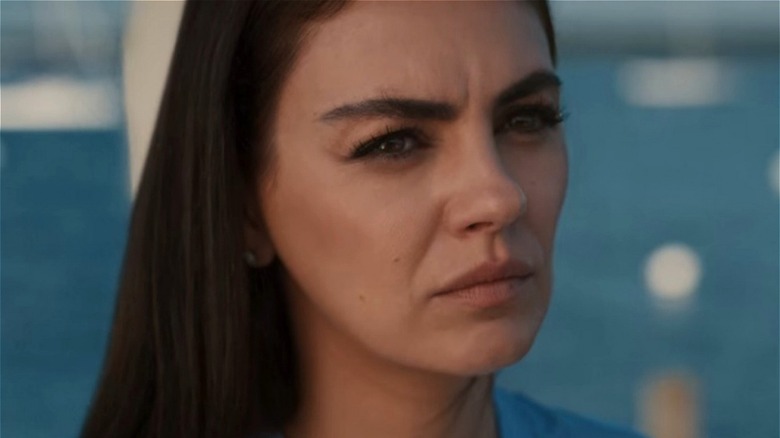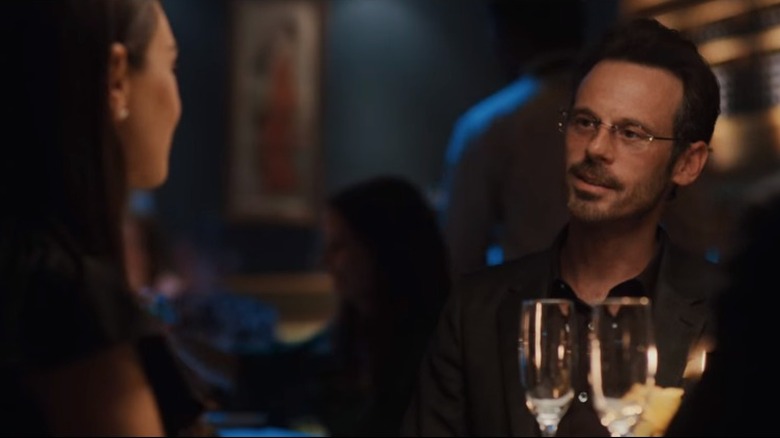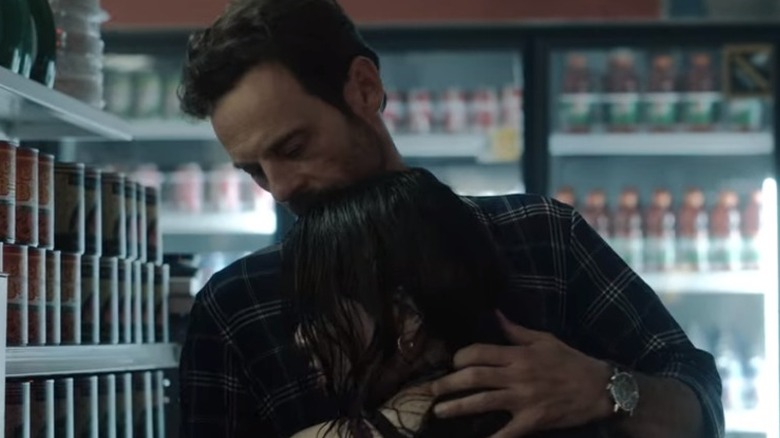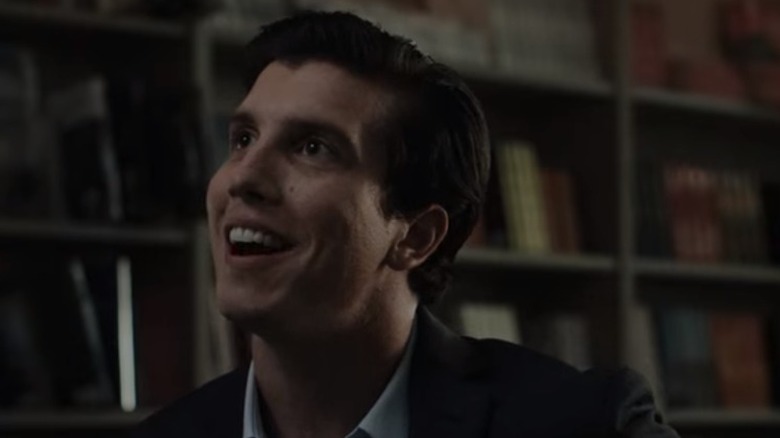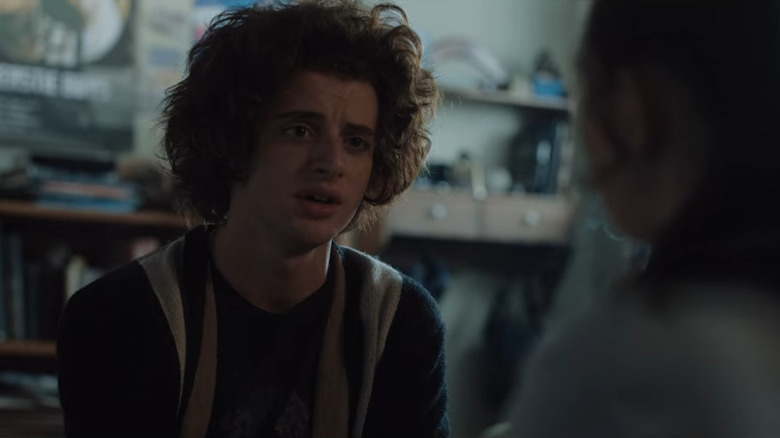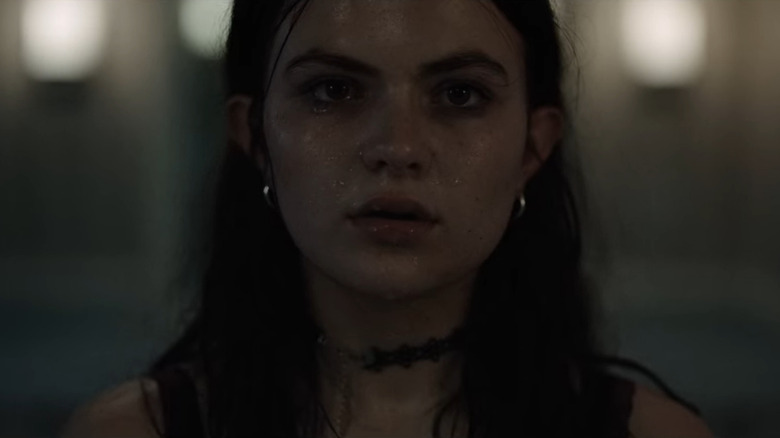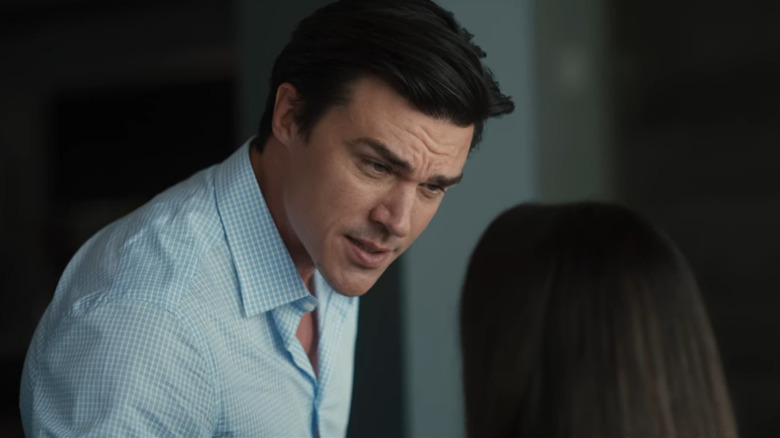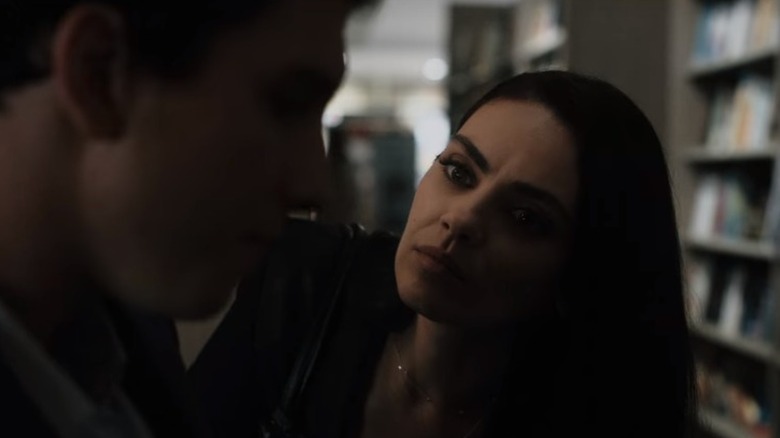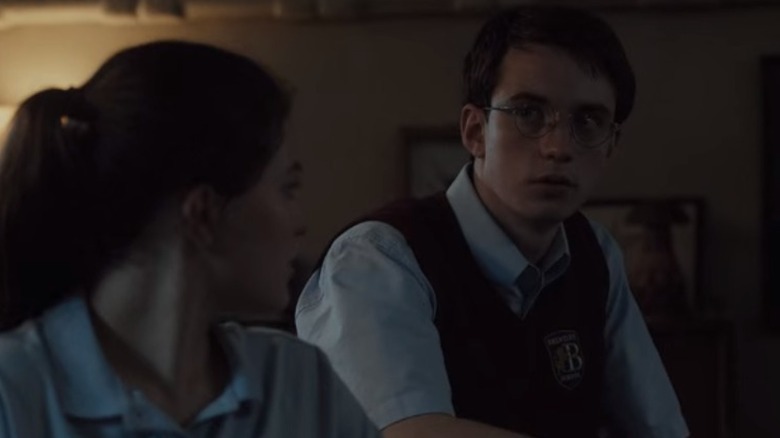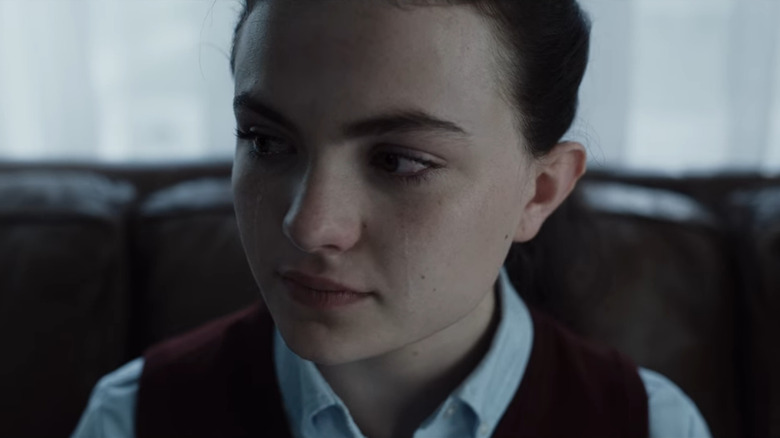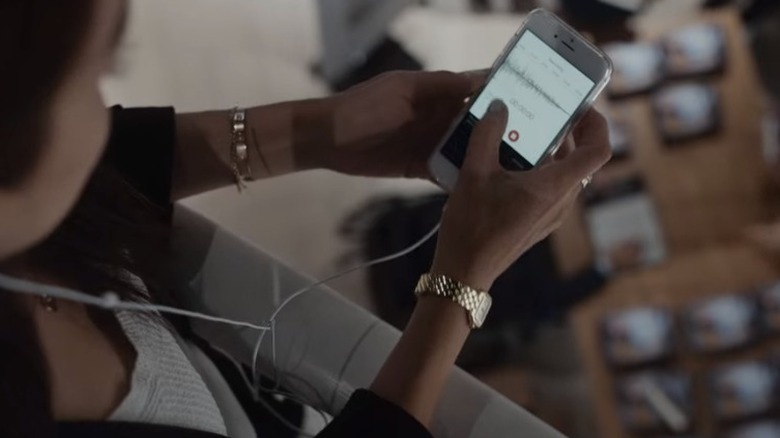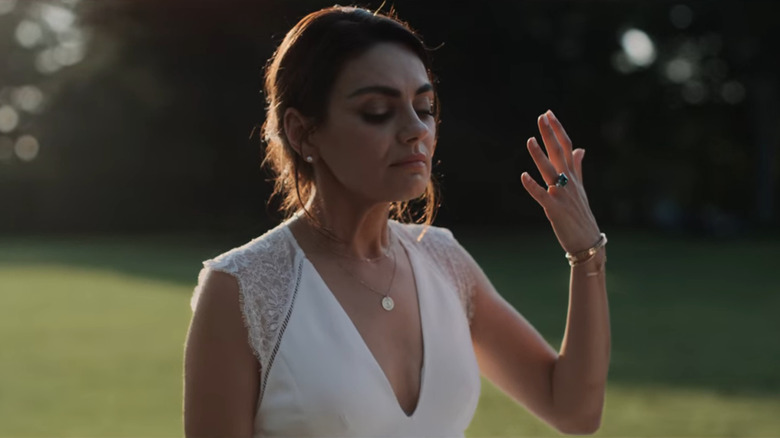All The Differences Between The Luckiest Girl Alive Book And Film
The following article includes discussions of gun violence and sexual assault.
Contains spoilers for "Luckiest Girl Alive"
"Luckiest Girl Alive" by Jessica Knoll saw changes big and small in its journey to a film adaptation for Netflix. Based on Knoll's real life, "Luckiest Girl Alive" follows Ani, a writer in New York who has crafted a picture-perfect life for herself. That is, until she is asked to be in a documentary where she'll need to rehash the most mentally traumatizing and reputation-damaging events she's ever faced.
Ani has a lot of characters by her side throughout the book and film, both in high school and her adult life. However, some of the characters, emotions, and relationships changed when creating the film version. Because the book is based on Knoll's real-life traumas, it was important to her to change the film based on her current state. As she told Bustle, Knoll has grown and changed very much in the seven years since the 2015 novel was published and the 2022 film was released. With that change, she wanted to make sure she stayed true to the story while bringing a more satisfying conclusion to women amid the #MeToo movement.
Fans of the book will definitely notice some key changes, though. Read on to see what changes made their way into the film and exactly how they differed from the source material.
Mr. Larson and Ani's attraction
One of the biggest differences in the adaptations is Mr. Larson (Scoot McNairy) and TifAni's (Mila Kunis as an adult, Chiara Aurelia as a kid) relationship. Nearly everything about their relationship from the book is wiped out and changed in the film. In the film, Mr. Larson is a teacher she likes at her school and one who happens to help her when she's going through her trauma. Then, as adults, they meet based on a happenstance when Luke arranges a dinner with Mr. Larson and his wife, not knowing his previous encounters with TifAni. When Ani meets Mr. Larson again, there's nothing but platonic respect and trauma bonds to forge the relationship, and it ends there.
However, in the book, Mr. Larson's relationship with TifAni is one of the biggest plot lines. When TifAni was in school, she had a huge crush on Mr. Larson. Their relationship when she was younger was close, definitely too close for a teacher and a student. Though they never engaged sexually when she was young, their relationship did somewhat cross a line of a normal boundary. Then as adults, Ani and Mr. Larson have a lot of tension between them and this builds the closer the documentary gets to filming. We see this relationship starting to bloom between them and even cross the line, especially when they go back to Bradley to film their pieces of the documentary. This attraction is nonexistent in the film.
TifAni chooses to turn to Mr. Larson
Another huge discrepancy between the book and film is the way in which Ani chooses to turn to Mr. Larson about the assault. In the film, after her assault, Ani leaves the party and heads to a gas station. While there, she just happens to run into Mr. Larson, and because she trusts him, turns to him for help. He takes her back to his apartment, helps her get cleaned up, and then firmly expresses the need for boundaries in this situation. However, he does offer to help her come forward, take her to the hospital to get a rape kit or anything else she needs. However, TifAni doesn't tell anyone, and when Mr. Larson does, she declines to press charges and he is fired.
In the book, she doesn't happen to run into him. After her first assault from the three boys, TifAni decides not to say anything so she can preserve her popularity. However, rumors quickly flood the school about what happened, and the story starts to become twisted. Mr. Larson hears about these rumors and talks to TifAni. He tells her that she can talk to him if he wants and that he'll help her to press charges or anything she needs. In the book, the way Mr. Larson handles the situation better shows how much he cares about TifAni, rather than just happening to be the one she sees first.
If you or anyone you know has been a victim of sexual assault, help is available. Visit the Rape, Abuse & Incest National Network website or contact RAINN's National Helpline at 1-800-656-HOPE (4673).
Dean's life is a surprise in the book
A huge part of the film and why Ani is so hesitant to sign on to the documentary is because of Dean's (Alex Barone) involvement. Dean is one of the boys (played by Carson MacCormac), if not the ringleader, who was responsible for Ani's assault, so for Ani to try and face him in this documentary makes her not want to do it. Furthermore, in the film, Dean is this huge anti-gun activist who has spent his life trying to protest and become a figure in the movement to outlaw guns. Ani is afraid because she thinks people won't believe the sex columnist over the gun protester when it comes to her involvement in the shooting and her rape — mainly why she's hesitant to do the documentary in the first place.
In the book, the fact that Dean is alive is a surprise, but what's even more of a surprise is the fact that he is in a wheelchair and is participating in the documentary at all. Though Dean's involvement is a huge plot point throughout the film, the book doesn't show Dean's involvement until near the end. The film spends much more time having Ani focused on Dean and receiving this vindication from him, whereas the book is more about her mental health journey to do the documentary and eventually finding a way to get the conclusion she needed from Dean.
If you or anyone you know has been a victim of sexual assault, help is available. Visit the Rape, Abuse & Incest National Network website or contact RAINN's National Helpline at 1-800-656-HOPE (4673).
Arthur's character
In the film, the audience sees TifAni make two real friends at Bradley: Arthur (Thomas Barbusca) and Ben (David Webster). They're the only people who defend her, don't force her to be someone she's not, and love her for who she is from the beginning. Arthur, in the film, is portrayed as this indie kid who knows how to make gabs at popular kids and will get others to laugh with him instead of at him (think Eddie Munson from "Stranger Things" or J.D. from "Heathers"). We see his motivation for participating in the school shooting as being more angry with the system of popularity and the lack of initiative from Ben and TifAni to take matters into their own hands when receiving this bullying.
However, in the book, Arthur is much more the type who would get bullied. He's a nerd, a social outcast, and a total loser whom people would rather laugh at than with. He's still angry with the way his friends are treated and their lack of initiative, but there's much less confidence and go-with-the-flow personality in the book than in the film, where it seems like Arthur would be above the system. Their motivations come from similar places, but the film version of Arthur seems like he'd rise above and not concern himself with getting revenge, whereas the book version of Arthur makes a lot more sense for the stereotypical bullying-turned-rampage story.
Ani's backstory
Ani is an extremely compelling character. We learn that she won a writing competition to earn a scholarship for her prestigious school, we see her evolve to become in the popular crowd, and we watch as she grows into an adult who is clawing for the life she's dreamed of and won't take no for an answer. The film does give us a lot of context about who Ani is and where she came from, but the film is missing a large amount of Ani's backstory that makes her an even more captivating protagonist.
In the book, the audience reads about TifAni's time at Mount St. Teresa, a private school Ani attended before she went to Bradley. At Mount St. Teresa, TifAni got caught smoking pot, which initiated her transfer. She wanted to go to Bradley, a school with a prestigious reputation. When she gets there, though she makes a couple of friends, she immediately jumps at the chance to be in the popular crowd. She'll do anything necessary to stay popular and create a new version of herself, including dying her hair blonde, which is not mentioned in the film. There's more time in the book for the audience to see TifAni's true desperation at trying to fit in, and though the film captures some of this, there's a lot missing.
Her relationship with her father
In the film, a large plot point is Ani's relationship with her mother (Connie Britton). She finds her mother gauche and tacky, mostly because of her lack of money. Ani has worked so hard to create this rich New York life, where she's a big-time journalist and her fiancé (Finn Wittrock) is a successful money man, that she becomes embarrassed when her mother comes for wedding festivities and reveals the poor status from where she came. Additionally, when Ani is young, her relationship with her mother is incredibly strained. Her mother doesn't help TifAni when she finds out she was raped, but then she actually blames her and is embarrassed thinking about what people will say. Ani has no respect for her mother, but most of that is warranted by the way her mother treated her in childhood.
In the book, this relationship is strained, still. Ani and her mother can't find a way to get past the trauma that TifAni went through, and her mother even requests that Ani leave her name out of the documentary so as not to be embarrassed. However, the book shows a strained relationship between Ani and her father as well, especially in childhood. In the film, Ani's father isn't even a character. The filmmakers don't explain why Ani's father is out of the picture, but her mother is the only one there to showcase how taxing Ani's relationship with her parents is.
Luke's documentary support
Part of Ani's picture-perfect life is her fiancé, Luke. She and Luke have been together for quite a while and are getting ready for the wedding day in the film. Throughout the film, it always seems like Luke isn't quite as sensitive to her trauma as he should be for a partner, but at least it seems like he's trying. He encourages her to do the documentary, telling her that it will be good to get her side of the story out and that it might help her to move on. But that's where Luke's true spirit comes out — he doesn't want her to work through her trauma or become able to live with it. Luke wants her to move on. That's the reason he would never work for her, because he can't deal with the fact that she had trauma that she would never be able to move on from, only learn to live with.
In the book, Luke is like this as well. Don't be mistaken — both versions are nice. However, they are only nice when Ani's mental health isn't driving a wedge between them. Here's where book Luke and film Luke differ: book Luke doesn't want Ani to do the documentary. He shows his disdain for the project at every turn and is Ani's biggest reason for not wanting to participate.
Dean's apology
A big part of both versions of the story is getting Dean to sit down with Ani and apologize publicly for his actions. In the film, Dean doesn't give Ani an apology. Instead, he threatens her that if she brings up anything about the truth behind her not being involved in the shooting or that Dean was responsible for her gang rape, he would double down on his accusations and ruin her life. This proves that, as "evolved" as Dean may seem to the public from his high school days, he's still just as sick and evil now as he was then.
In the book, Dean does apologize. It's not genuine, appropriate, or meaningful to Ani in any way, but he does give her a forced apology. However, the conversation ends the same: Dean admits what he did and Ani records it. Both versions have Dean eventually showing regret for his actions, but the commonality here is that he doesn't regret what he did to Ani; he regrets what Ani and the truth might do to his reputation.
Ben's friendship
In the film, as the audience finds out, TifAni's relationships with Ben and Arthur are the only genuine friends she has at Bradley. They're there for her when no one else is, and always accept her for who she is rather than what the popular crowd made her. Ben is bullied by the popular kids, too. He wants revenge but is too scared to do anything, just like TifAni. It's Arthur's anger and rage that spark Ben's vengeful side, and the two plan the school shooting.
In the book, this is the same: Ben and Arthur both want revenge and vow to take down the popular kids in a school shooting. However, Ben in the book has a different relationship with TifAni and Arthur than in the film. In the book, Ben isn't a character until the shooting. The readers get to hear Ben's motivations, how he was bullied until he left school and was in a treatment center battling with the mental trauma he was left with from his time at Bradley, but other than hearing his backstory, the readers never see him until the shooting. He has a much bigger role in the film, acting as a friend who was with Arthur and TifAni all along until one day Arthur and Ben both just snapped. Their motivations for collaborating on the school shooting are the same, but their relationships are different, as Ben is not a part of the group.
If you have been impacted by incidents of mass violence, or are experiencing emotional distress related to incidents of mass violence, you can call or text Disaster Distress Helpline at 1-800-985-5990 for support.
Two incidents with Dean
In the film, the audience learns much about the horrible things Dean did to TifAni. There is a lot of graphic imagery that makes it difficult to watch, but necessary in understanding the severity of the situation. In the book and the film, Ani is invited to a party and is raped by three boys there, all of whom are her "friends" and one of whom is her boyfriend. In both versions, it seems that Dean is the ringleader, encouraging the others and participating.
However, here's where the versions differ: In the book, there are two incidents with Dean. The first one is the sexual assault, and there's a second one where Dean tries to assault her again, but TifAni pushes him off and then turns to Mr. Larson for help. This second incident is slightly mixed with the first incident in the film version. Dean rapes her, and TifAni pushes him off and runs away. This second incident isn't seen in the film, but for those who have read the book, it just proves how Dean is even more disgusting and evil than anyone will ever know.
If you or anyone you know has been a victim of sexual assault, help is available. Visit the Rape, Abuse & Incest National Network website or contact RAINN's National Helpline at 1-800-656-HOPE (4673).
The recording
In both versions of the story, Ani gets a recording of Dean admitting the truth. It's the vindication she wanted and needed to feel like she was getting her life back. The recording is a huge part of "Luckiest Girl Alive" and Ani's ending, but it's handled differently in both the film and book. In the film, Ani meets with Dean privately at a book signing he's doing. They talk, and he says he's not going to apologize unless she promises to keep her mouth shut about the sexual assault he committed. In exchange, he will admit to Ani not being involved in the shooting and apologize publicly. Ani agrees to this, setting him up, and tells him that she just wants to hear him privately admit it and that then they can move forward. He admits it, she records it, and she takes that recording and writes a story about it, attaching the recording to the article and exposing Dean for who he really is — all in The New York Times. This paves the way for other women to come forward and tell their stories and feel like they're not alone, and she takes down her rapist.
In the book, there is no article. Ani does get the recording in a similar secretive fashion, but it's up to the audience to decide what she does with it. It might just be that Ani wanted the recording for herself, so she could have that piece of conclusive evidence that Dean did what she said he did. Or she might turn it into an article after the book ends. Either way, the audience is left to decide what Ani does with her vindication.
If you or anyone you know has been a victim of sexual assault, help is available. Visit the Rape, Abuse & Incest National Network website or contact RAINN's National Helpline at 1-800-656-HOPE (4673).
Luke and Ani's split
In both the film and the book, it's clear Luke isn't the right person for Ani. He's nice, and in many ways, he's the person Ani was looking for, but he isn't right for the strong woman Ani is and the trauma that Ani will have to live with forever. Though the outcome and reasoning of their split in both versions are the same, the catalyst is slightly different. In the film, Luke and Ani are celebrating their rehearsal dinner when Ani gets the call that her article and recording of Dean will be published in The New York Times. She pulls Luke aside to tell him the news, but instead of being proud or happy for her, he's disappointed. He doesn't want her business aired out in public like that and would rather she just move on.
Ani realizes that Luke isn't the right person for her and that he never will be — not just because of who he is but because of her motivations for being with him. They split up, and Ani takes the job at The New York Times, ready to live a more authentic life than she has been. In the book, her motivation for leaving Luke is the same, but there's not an article to drive the couple to their split. Ani realizes that Luke doesn't accept her whole self, but she does this on her own without the mirror of the article to lead her to that conclusion.
